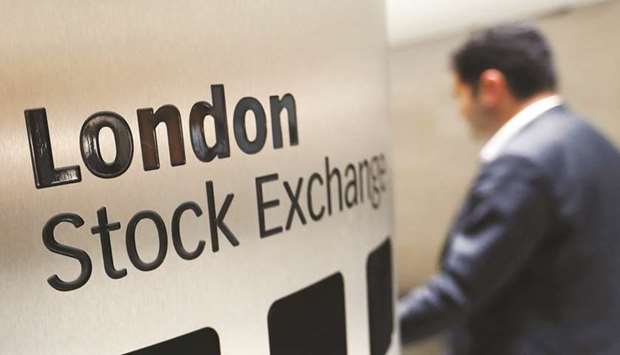Europe’s main stock markets ended the week in positive territory yesterday after Asian indices halted their slide, with investor nervousness easing over the rapid spread of a viral illness in China.
“There’s a hope that the coronavirus is contained, particularly in China,” Interactive Investor analyst Richard Hunter told AFP.
“And that’s something of a relief rally — (and) also with the earning season so far so good.
“So the last few days provided an opportunity to investors to buy on the cheaper side,” Hunter added.
OANDA senior market analyst Edward Moya warned, however, that “concerns are growing that the travel bans in place (in China) will start to have a major impact on the economy” which could trim Chinese GDP by 1 percentage point or more.
“Oil’s beating continues as the lock-down situation keeps getting worse in China,” added Moya as the price of Brent cruise and WTI sagged by around 2.0%.
After adding 1.6% during the afternoon, London’s benchmark FTSE 100 ended the session 1.1% higher at 7,585.98 points ahead of Thursday’s close while Frankfurt posted a gain of 1.4% at 13,576.68 points and Paris rose by 0.9% at 6,024.26 points.
Wall Street was more cautious, dipping some two hours into trading after edging 0.3% higher minutes after the opening bell.
The pan-European STOXX 600 climbed 0.9%, having crossed a record high earlier in the day.
The index had marked four straight sessions of declines amid widespread concerns over a new virus causing economic disruptions in China, one of the bloc’s biggest trading partners.
While the HIS Markit’s Euro Zone Composite Flash Purchasing Managers’ Index (PMI) came in slightly below expectations, a surprise jump in manufacturing activity brewed some optimism over a return to expansion in 2020.
“With a Phase 1 trade deal in place, additional no car tariffs for the moment and some certainty about the Brexit timeline, some of the factors holding back manufacturing output have improved,” ING economists wrote in a note.
“With manufacturing showing early signs of recovery and the service sector continuing to grow, chances of a recession are receding further.
We are expecting growth to very gradually pick up over the course of the year.” Utilities were among the best performing subindexes, with German renewables player RWE leading gains.
The utility firm’s chief executive, Rolf Martin Schmitz, flagged his possible exit next year.
Technology stocks also rose, with stronger results from US chipmaker Intel Corp bolstering the outlook for the sector.
Germany’s DAX saw its best day in more than two months after PMI data showed that the country’s private sector gained momentum in January, while a pullback in manufacturing eased.
Among individual stocks, Bayer was among the biggest boosts to DAX after a report on a possible out-of-court settlement of a US
jury trial over allegations that its weed killer Roundup causes cancer.
Swedish telecoms equipment group Ericsson was on track for its worst day in about six months after it reported a smaller-than-expected rise in fourth-quarter core earnings.
Nokian Tyres hit a more than four-year low as the Finnish tyre maker forecast its 2020 sales and operating result to significantly decline from a year earlier due to weak performance in its Russia operations.
Shares of French pharma company Ipsen tumbled to the bottom of the STOXX 600 after it paused dosing in rare bone diseases drug Palovarotene.
Asian stock markets had earlier halted their slide with investor nerves eased after a week of volatility.
China’s coronavirus infection has killed at least 26 people while the number of confirmed cases has leapt to 830, health officials said.
Authorities have shut down public transport in 13 cities — together home to more than 40mn people — around the epicentre of the outbreak in Wuhan.
“Markets are fearful the virus could spread, and even if it doesn’t the impact on China could be large,” added National Australia Bank analyst Tapas Strickland.
However, the World Health Organisation has stopped short of declaring a global health emergency — a rare instrument used only for the worst outbreaks.
For Capital Economics’ Caroline Bain, “we suspect that any hit to global growth from the coronavirus will be temporary and probably smaller than during the Sars outbreak in 2003.”
“The WHO has provided a hefty dose of market prescribed penicillin that has lowered investors’ fever for the time being,” said AxiCorp chief market strategist Stephen Innes.
Hong Kong was down nearly 4% for the week but closed 0.2% higher after a half-day session ahead of the Chinese New Year holiday.
Mainland bourses began their week-long break for the holiday, a day after the Shanghai exchange shed nearly three% in its worst pre-Lunar New Year market fall on record.
Fears remain that the holiday — when hundreds of millions of people travel across China — could catalyse a further spread of the virus and knock-on market headwinds.

A visitor passes a sign inside the London Stock Exchange Group headquarters. The FTSE 100 ended the session 1.1% higher at 7,585.98 points yesterday.
